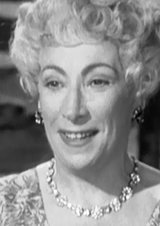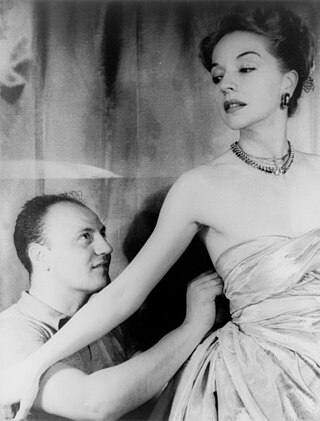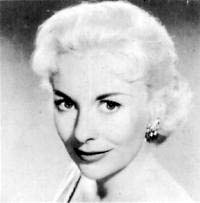
Sir Norman Bishop Hartnell was a leading British fashion designer, best known for his work for the ladies of the royal family. Hartnell gained the Royal Warrant as Dressmaker to Queen Elizabeth in 1940, and Royal Warrant as Dressmaker to Queen Elizabeth II in 1957. Princess Beatrice also wore a dress designed for Queen Elizabeth II by Hartnell for her wedding in 2020.

Jean Paul Gaultier is a French haute couture and prêt-à-porter fashion designer. He is described as an "enfant terrible" of the fashion industry and is known for his unconventional designs with motifs including corsets, marinières, and tin cans. Gaultier founded his eponymous fashion label in 1982, and expanded with a line of fragrances in 1993. He was the creative director for French luxury house Hermès from 2003 to 2010, and retired following his 50th-anniversary haute couture show during Paris Fashion Week in January 2020.

Martita Edith Hunt was an Argentine-born British theatre and film actress. She had a dominant stage presence and played a wide range of powerful characters. She is best remembered for her performance as Miss Havisham in David Lean's Great Expectations (1946).

Edward Henry Molyneux was a leading British fashion designer whose salon in Paris was in operation from 1919 until 1950. He was characterised as a modernist designer who played with the refinements of couture style, a modernist aesthetic, and the desire to be socially and culturally advanced.

History of fashion design refers specifically to the development of the purpose and intention behind garments, shoes, accessories, and their design and construction. The modern industry, based around firms or fashion houses run by individual designers, started in the 19th century with Charles Frederick Worth who, beginning in 1858, was the first designer to have his label sewn into the garments he created.
Kristen McMenamy is an American model known for her unconventional, androgynous appearance. Originally a long-haired redhead, she reinvented her look in the early 1990s by having her hair cut short and dyed black, and her eyebrows shaved off. Her career was boosted by the advent of the grunge fashion trend.

Paris Fashion Week is a series of designer presentations held semi-annually in Paris, France, with spring/summer and autumn/winter events held each year. Dates are determined by the Fédération de la Haute Couture et de la Mode. Paris Fashion Week is held at venues throughout the city.

Muriel Lilian Pavlow was an English actress. Her mother was French and her father Russian.

Caroline Reboux was a Parisian milliner and French fashion designer. She opened her first boutique at 23 rue de la paix in Paris in 1865, which she continued to operate throughout her life. Reboux opened other shops in Paris and London starting in 1870. She trained other milliners who became famous in their own right, including American milliner Lilly Daché and French milliner Rose Valois. Reboux's most famous shop was located at 9 Avenue Matignon in Paris, which carried on operating after her death for almost three decades under the direction of Lucienne Rabaté known as "Mademoiselle Lucienne" the most famous parisian milliner at that time.

Haute couture is the creation of exclusive custom-fitted high-end fashion design. The term haute couture is French, "haute" meaning "high" or "elegant," and "couture" translating to "sewing" or "dressmaking." The term haute couture generally refers to a specific type of upper garment common in Europe during the 16th to the 18th century, or to the upper portion of a modern dress to distinguish it from the skirt and sleeves. Beginning in the mid-nineteenth century, Paris became the centre of a growing industry that focused on making outfits from high-quality, expensive, often unusual fabric and sewn with extreme attention to detail and finished by the most experienced and capable of sewers—often using time-consuming, hand-executed techniques. Couture translates literally from French as "dressmaking", sewing, or needlework and is also used as a common abbreviation of haute couture and can often refer to the same thing in spirit.
Ma Ke is a Chinese fashion designer. She has two clothing labels: EXCEPTION de Mixmind, a ready-to-wear line started in 1996 and retailed in China; and WUYONG, an haute couture line founded in 2006. In 2007, Ma Ke starred in the award-winning documentary Useless by Chinese director Jia Zhangke. In 2008, her fashion house WUYONG was appointed as a Guest member of the Chambre Syndicale de la Haute Couture in France.

Jane Hylton was an English actress who accumulated 30 film credits, mostly in the 1940s and 1950s, before moving into television work in the latter half of her career in the 1960s and 1970s.
Out of True is a 1951 British drama-documentary film, directed by Philip Leacock and starring Jane Hylton and Muriel Pavlow. Out of True was made by the Crown Film Unit with sponsorship from the Ministry of Health, and was promoted as a "fictional account of a nervous breakdown which conforms to the pattern of much of the mental illness occurring today". The film received a nomination in the category Best Documentary Film at the 1951 British Academy Film Awards. Its production was motivated, in part, by the U.S. film Snake Pit, which some critics in the UK feared would cast all psychiatric hospitals in a negative light.

Svengali is a 1954 British drama film directed by Noel Langley and starring Hildegard Knef, Donald Wolfit and Terence Morgan, based on the 1894 novel Trilby by George du Maurier. Svengali hypnotises an artist's model into becoming a great opera singer, but she struggles to escape from his powers. It was distributed in the United States by Metro-Goldwyn-Mayer.
Beril Jents was an Australian fashion designer. She is recognized as "Australia’s first queen of haute couture" and specialized in evening and bridal wear, although the term "haute couture" is not strictly correct in this context as it refers to high-end made-to-measure fashion design.

Laura Yumi Lambert is a Belgian model.
Harriadnie Beau Phipps is an English fashion model and brand ambassador. She appeared in numerous publications and media to promote various brands and products, including Vogue, Elle, Ok! Extra magazine, She took on the role of 'The Face' FaceOn magazine, HMH Couture, Pia Michi, Jensen Interceptor specialist Cropredy Bridge, UK Tights, celebrity club Sugar Hut, and worked for Anoosh. She was a celebrity columnist for FaceOn beauty magazine with 'The Harriadnie Beau Diaries a regular fashion and beauty column. In 2012, Harriadnie was a guest judge at Salon Prive car show alongside Jamiroquai's Jay K, Deborah Arthurs and Liz Brewer for Boodles Ladies Day. Beau was a judge in a fashion show. She turned down a role in the reality television series The Only Way Is Essex to focus upon her career in haute couture fashion. In 2012 she was appointed brand ambassador to the Tushek T500, Slovenia's only supercar. In 2014 Harriadnie Beau unveiled the classic car Jenson FF by Jensen Interceptor alongside CAR SOS presenter Fuzz Townshend. Harriadnie took part in Madeira Fashion Week 2018 taking the runway for Cristiano Ronaldo CR7 as one of his hand picked models. In 2018 she was crowned Miss Madeira, Film festival International whilst working for Ronaldo.
Antonio Cánovas del Castillo de Rey, known professionally as Antonio Castillo, was a Spanish fashion and costume designer who won an Academy Award for the film Nicholas and Alexandra in the category Academy Award for Best Costume Design during the 1971 Academy Awards, that he won along with Yvonne Blake.

Guo Pei is a Chinese fashion designer. She is best known for designing dresses for Chinese celebrities, and in America for Rihanna's trailing yellow gown at the 2015 Met Gala. Guo is the first born-and-raised Asian designer to be invited to become a guest member of the Chambre Syndicale de la Haute Couture. In 2016, Time listed her as one of the World's 100 Most Influential People.
Neillí Mulcahy was an Irish designer. In 1962, Mulcahy co-founded the Irish Haute Couture Group with Ib Jorgensen and Irene Gilbert.













